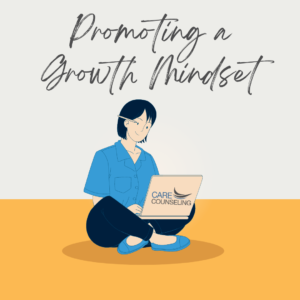Promoting a Growth Mindset:
 A growth mindset is a powerful tool that can significantly impact a person’s ability to learn and achieve success in various aspects of life. Coined by psychologist Carol Dweck, a growth mindset is the belief that skills and intelligence can be developed through dedication, hard work, and perseverance. In contrast, a fixed mindset believes that talents and intelligence are innate and unchangeable. As parents, educators, and caregivers, fostering a growth mindset in children can pave the way for a positive attitude toward learning and a willingness to embrace challenges.
A growth mindset is a powerful tool that can significantly impact a person’s ability to learn and achieve success in various aspects of life. Coined by psychologist Carol Dweck, a growth mindset is the belief that skills and intelligence can be developed through dedication, hard work, and perseverance. In contrast, a fixed mindset believes that talents and intelligence are innate and unchangeable. As parents, educators, and caregivers, fostering a growth mindset in children can pave the way for a positive attitude toward learning and a willingness to embrace challenges.
Understanding the Growth Mindset:
At the core of a growth mindset is the understanding that abilities and intelligence can be cultivated through effort and learning. Individuals with a growth mindset view failures and setbacks as opportunities to learn and grow, rather than evidence of their limitations. They are more likely to embrace challenges, persist in the face of obstacles, and take on new opportunities with enthusiasm.
Promoting a Growth Mindset:
- Praise Effort and Persistence:
When offering praise to children, focus on their effort, determination, and perseverance rather than fixed traits or outcomes. Acknowledge their hard work in overcoming challenges and emphasize the value of continuous learning and improvement.
- Embrace Mistakes as Learning Opportunities:
Teach children that mistakes are a natural part of the learning process and should be embraced as opportunities for growth. Encourage them to analyze their mistakes, identify what went wrong, and explore ways to improve in the future.
- Teach the Power of “Yet”:
Incorporate the word “yet” into conversations about challenges. For example, if a child says, “I can’t do this,” encourage them to rephrase it as “I can’t do this yet.” The addition of “yet” instills a sense of possibility and potential for growth.
- Model a Growth Mindset:
Children learn by example, so demonstrate a growth mindset in your own actions and language. Share stories of your own challenges and how you overcame them through perseverance and hard work. Be open to learning new skills and show enthusiasm for personal growth.
- Encourage a Love for Learning:
Promote curiosity and a love for learning in children. Please encourage them to explore new subjects, hobbies, and interests. Engage in discussions about various topics and demonstrate the joy of discovering new knowledge.
- Set Realistic Goals:
Help children set realistic and achievable goals for themselves. Break down larger objectives into smaller, manageable steps, and celebrate their progress along the way. This reinforces the idea that progress is possible with dedication and effort.
- Provide Constructive Feedback:
Offer constructive feedback that focuses on specific strategies and areas for improvement—frame feedback to support their growth and development rather than criticize their abilities.
- Encourage a Growth-Oriented Learning Environment:
Create a learning environment that celebrates effort, perseverance, and growth. Encourage collaboration, experimentation, and the sharing of ideas. Avoid comparing children to one another and instead celebrate their unique strengths and progress.
Promoting a growth mindset in children is a powerful way to foster a positive attitude toward learning and personal development. By praising effort and persistence, embracing mistakes, and modeling a growth mindset, parents and educators can instill in children a belief in their own potential to learn and grow. Encourage a love for learning, set realistic goals, and provide constructive feedback to create a nurturing environment that empowers children to embrace challenges with enthusiasm and resilience. With a growth mindset, children can develop a lifelong love of learning and approach life’s challenges with confidence and determination.



























